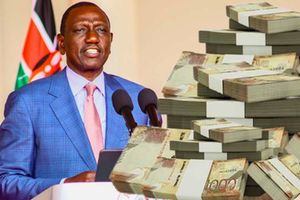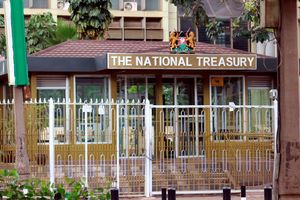
The cost of running public offices up Sh86 billion.
The cost of running public offices at the national level rose 9.49 per cent in nine months ended March 2025, Treasury data shows, signaling difficulties in enforcing budget cuts at a time when revenue underperformed targets.
State ministries, departments, and agencies spent Sh991.75 billion in recurrent votes such as on salaries and wages, administration, operation, and maintenance of offices in the review period compared with Sh905.78 billion in a similar period a year earlier.
The Sh85.97 billion increase came in a period President William Ruto pledged to improve efficiency in public expenditure after deadly protests forced the government to drop a plan for new and higher taxes.
The increase in recurrent expenditure raced at a pace more than double that of inflation, with the average annual rise in prices of goods and services averaging 3.44 per cent between July 2024 and March 2025.
The Treasury wrote in the 2024 Budget Outlook and Review Paper last September that the budget cuts were targeted at recurrent spending needs, a point it stressed in February this year through the 2025 Budget Policy Statement.
“Government will sustain measures to strengthen expenditure control and improve efficiency and effectiveness in public spending. These measures will include… implementation of austerity measures aimed at reducing government recurrent expenditure,” the Treasury wrote in the BPS, a document which spells out expenditure ceilings.
Under the budget measures announced by Dr Ruto at the beginning of the current fiscal year in July, the budget for the offices of the first and second ladies were scrapped as was confidential budgets for State House and all public offices.
The President also suspended the purchase of new high-end vehicles, whose cost can top Sh30 million per unit, for the first six months, halved government advisers, and ensured enforced retirement of public servants on attainment of age 60.
The austerities also targeted non-essential expenditures such as printing, advertising, travel, communication supplies and services, training, hospitality, furniture, refurbishment, and vehicle purchase as well as research and feasibility studies for public offices.
The administration has, however, struggled to cut government advisors. For example, the administration failed to slash members of the Presidential Council of Economic Advisors, with the think tank at the State House being expanded instead.
Advisers who have since joined the Executive Office of the President include former CS Moses Kuria and former PS Edward Kisiang’ani as well as Joe Ager and Silvester Kasuku who are allies of ODM leader Raila Odinga.

Dr Silvester Kasuku (left) Prof Adams Oloo and Mr Joe Ager.
The government has also struggled to enforce the directive on public servants to retire at the age of 60, with Inspector General of Police Douglas Kanja and Director of Criminal Investigation (DCI) Mohammed Amin reportedly getting two-year contracts.
Sh13.25 billion
The Treasury data shows the State Department for Social Protection and Senior Citizens posted the largest growth in recurrent expenditure in the review period at 55.93 per cent to Sh31.82 billion, followed by Public Health and Sanitation at 48.30 per cent to Sh13.25 billion.
Ministry of Defence’s recurrent spending jumped 36.20 per cent to Sh116.81 billion, National Intelligence Service’s climbed 34.41 percent to Sh43.78 billion, while National Treasury’s increased 21.01 per cent to Sh45.63 billion.
The data shows the recurrent expenditure for the State House, on the other hand, dipped 29.58 per cent to Sh5.73 billion, that of the Office of Deputy President fell 29.90 per cent to Sh1.91 billion while the spending at Prime Cabinet Secretary’s office plunged 72.27 per cent to Sh215.16 million.
The growth in recurrent expenditure in the review period this fiscal year was, however, slower than 11.18 per cent in the prior year to Sh905.78 billion, but higher than 1.96 per cent to Sh814.71 billion during Dr Ruto’s first year in office.
“The Kenyan government [under Dr Ruto] had initially made good progress in tackling the poor public finances. There have been signs of fiscal slippage recently, though, as spending has increased and revenues have underperformed,” Jason Tuvey, deputy chief emerging markets economist at UK-based Capital Economics, wrote in an earlier note on Kenya. “That spurred the government, in the 2024/25 Budget, to outline a raft of tax increases in a bid to get its fiscal consolidation plans back on track.”







